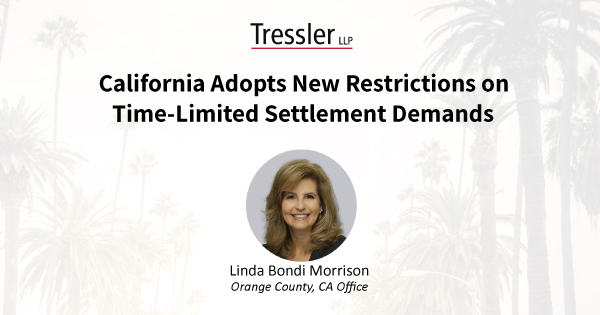
Effective January 1, 2023, new rules govern pre-suit time-limited settlement demands in California. Section 999, et seq. of the California Code of Civil Procedure governs time-limited settlement offers made to a tortfeasor with liability insurance for purposes of settling the claim within the limit of insurance. Significantly, the new legislation applies only to demands made prior to the filing of a complaint or demand for arbitration to settle claims involving personal injury, property damage, bodily injury or wrongful death. It applies to all civil claims covered under automobile, motor vehicle, homeowner and commercial premises liability insurance policies. It does not apply to claimants who are not represented by counsel.
A claimant’s failure to substantially comply with the terms of Section 999 means that the demand shall not be considered a reasonable offer to settle the claims for an amount within policy limits in the event of a subsequent lawsuit by a claimant (including as an assignee of an insured or by the insured for the benefit of the claimant) seeking extracontractual damages.
Section 999.1 requires that a time-limited settlement demand:
- Must be in writing
- Must be labeled as a time-limited demand or reference Section 999.1
- Must contain the material terms of the demand, which include:
- The time period for acceptance, not fewer than 30 days from the date of transmission of demand if transmission is by email, fax, or certified mail, or at least 33 days if transmission is by mail
- A clear and unequivocal offer to settle all claims within policy limits, including satisfaction of all liens
- An offer for a complete release for the insureds from all present and future liability for the occurrence
- Date and location of loss
- Claim number, if known
- Description of all known injuries sustained by the claimant
- Reasonable proof sufficient to support the claim, such as medical records or bills
Section 999.2 imposes the following delivery requirements:
- A claimant must send its time-limited demand to either:
- The email or physical address designated by the insurer for receipt of time-limited demands, if an address has been provided by the insurer to the Dept. of Insurance (“DOI”) and the DOI has made the address publicly available
- The insurance representative assigned to handle the claim (if known)
- The DOI shall post on its website the email address or physical address designated by a liability insurer for receipt of time-limited demands
Section 999.3 provides guidelines for accepting a demand:
- Recipients may accept the demand in its entirety in writing
- Recipients may attempt to seek clarification or additional information or request an extension due to the need for further information or investigation. If made during the time within which to accept the demand, it shall NOT in and of itself be deemed a counteroffer or rejection of the demand
- An insurer NOT accepting the demand must notify the claimant in writing of its decision and the basis for its decision. Notification must be sent prior to the expiration of the demand, including any extension agreed to by the parties, and will be relevant in any lawsuit seeking extracontractual damages against the insurer
For more information about this article, please contact Linda Bondi Morrison at lmorrison@tresslerllp.com.
About the Author

Linda Bondi Morrison is the Managing Partner of Tressler’s Orange County, California office. She represents insurance companies in complex litigation and coverage matters involving general and professional liability, excess exposures and extracontractual liability, including environmental and toxic torts, construction defects and advertising/personal injury. She has extensive experience in matters involving complex insurance programs and the allocation and coverage challenges they present. Linda has represented clients as trial counsel in a number of significant, complex matters in California and across the country. In addition to providing litigation counsel, Linda is regularly called on by insurance companies to assist with policy drafting and settlement or resolution of non-litigated matters involving complex questions of insurance coverage and liability. She has successfully handled mediations and arbitrations with multimillion-dollar exposures, procuring favorable settlements for her clients.
